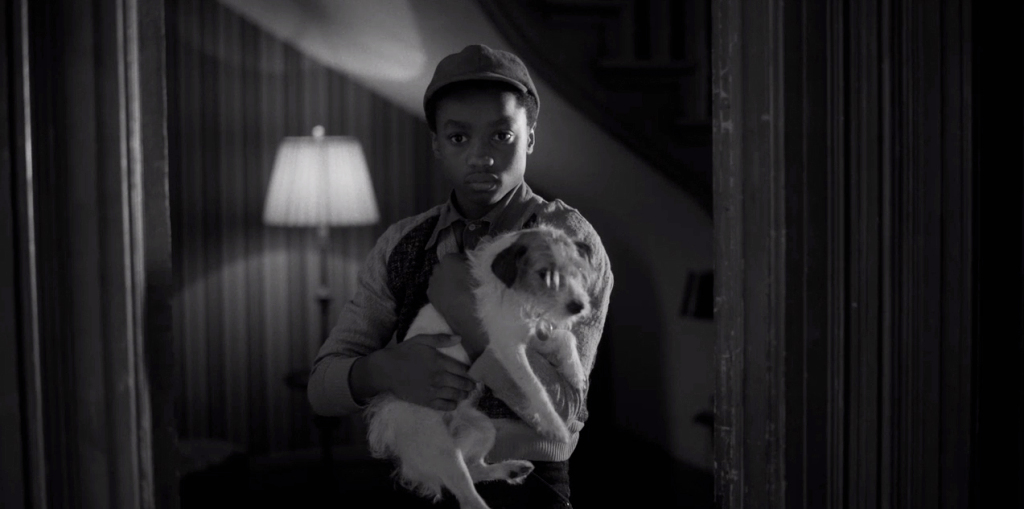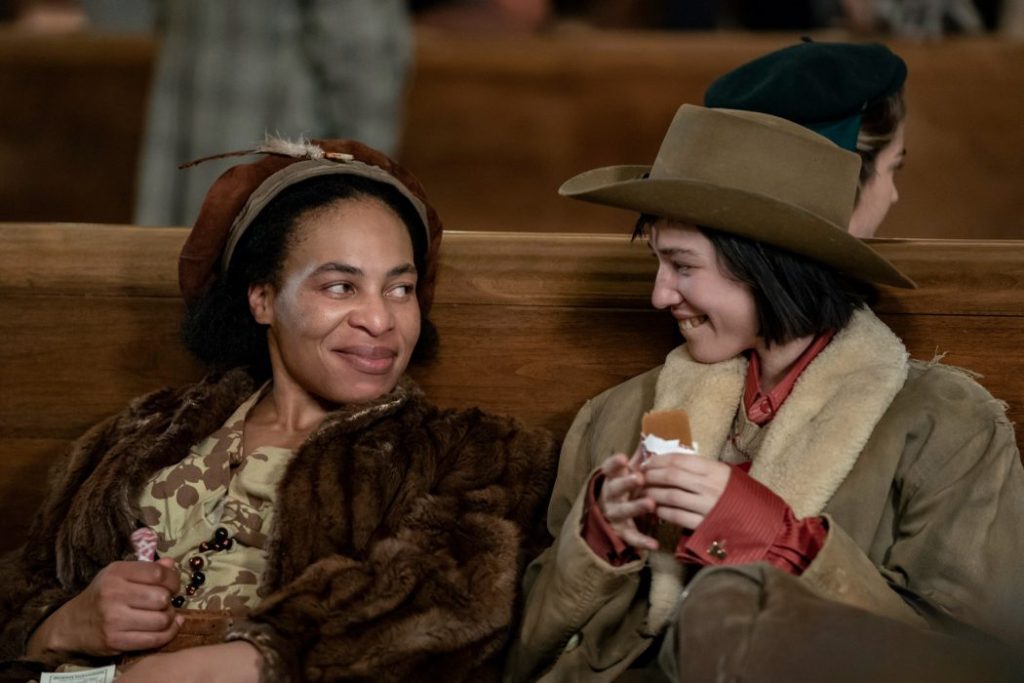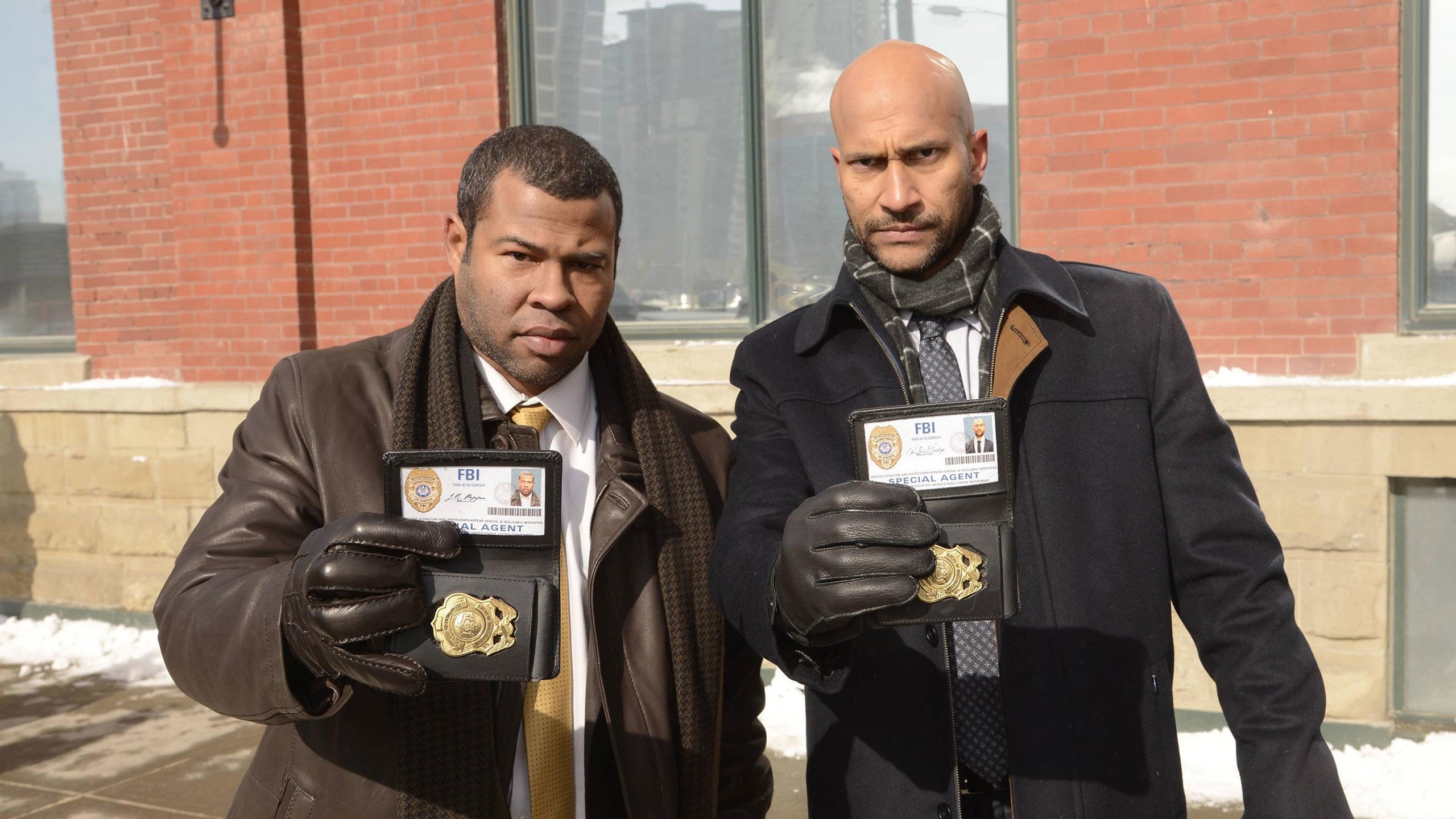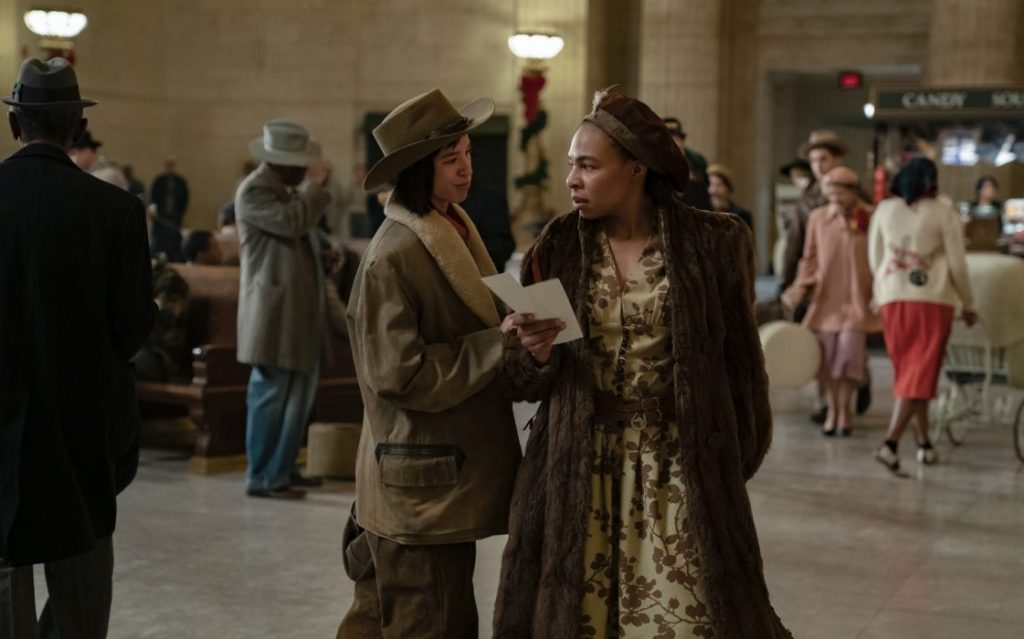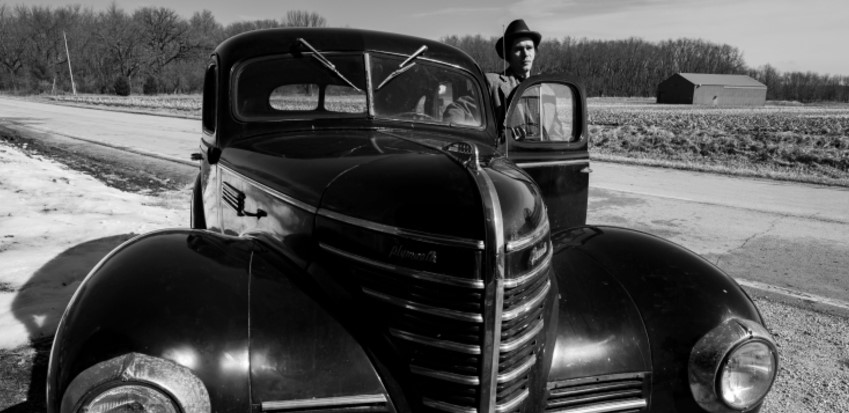As an anthology, each Fargo season possesses its own self-contained narrative, following a disparate set of characters in various settings and eras, albeit in a connected shared universe centered on the Midwestern United States and the titular city of Fargo, North Dakota. The fourth season is set in November 1950 in Kansas City, Missouri and follows two crime syndicates as they vie for control. The cast is led by Chris Rock, who plays Loy Cannon, the head of a crime syndicate made up of black migrants fleeing the Jim Crow South who have a contentious relationship with a fictionalized portrayal of the Kansas City mafia. Other cast members include Jessie Buckley, Jason Schwartzman, Ben Whishaw, and Jack Huston.
'Fargo' season 4 episode 1 is titled 'Welcome to the Alternate Economy.' The fourth season of the black comedy–crime drama series is set in 1950 in Kansas City on Missouri's western edge. It revolves around the lives of the members of two criminal organizations – the Faddas and the Cannons. In the premiere episode, we will be introduced to the main players of the cat and mouse game. The head of the Cannon family, Loy Cannon , is a syndicate boss who is a force to reckon with but is still denied respect because he is African-American. Upon its premiere on April 15, 2014, 'Fargo' opened to universal acclaim for its inventive storytelling, fascinating characters, dark and absurd humor, and unpredictable twists.
Created by Noah Hawley, the crime drama anthology series is inspired by the Academy Award-winning eponymous 1996 film by the Coen Brothers. Each season features a different setting, with a varied set of characters revolving around a new mystery. Over three seasons, the show has managed to recreate the essence of the original. In a history report, Ethelrida introduces us to the main concepts and conflict of the season.
In the pursuit of the American Dream and equality, several groups considered to be "Others" in the United States fight and kill each other over whatever power that they can grab. A great microcosm of the entire saga can be found in Rabbi Milligan's story. The youngest son of the Irish Milligan Concern, Rabbi earned his nickname after his father sent him to live with the rival Moskowitz crime family. The families believed that exchanging sons would help them keep the peace, but the Milligan's taught their boy well, and he helps them infiltrate the Moskowitz compound and wipe them out.
Fargo is a crime drama – black comedy anthology series from FX. The series is inspired by the Fargo movie , which was directed by the Coen Brothers . The Coens' film oeuvre is a heavy influence on the tv series. The latest series revolves around two crime families – one African-American and the other, Italian – struggling for supremacy. The Italians, meanwhile, are starting to enjoy the rewards of their newfound whiteness—a largely invisible transformation marked in The Godfather by Michael Corleone's relationship with naive WASP Kay Adams. Crafty, spoiled, crypto-corporate Josto (Jason Schwartzman, doing a scrappier, cannier take on his Louis XVI character in Sofia Coppola's Marie Antoinette) has long been Donatello's right hand.
But his younger brother Gaetano (Salvatore Esposito, imported from Sky Italia's acclaimed organized-crime drama Gomorrah), a brawny brute who came up in Sardinia busting heads for Mussolini, stands between Josto and the consolidation of power. In 1950 Kansas City, two crime syndicates fighting for a piece of the American dream have struck an uneasy peace. Together, they control an alternate economy of exploitation, graft and drugs. To cement their truce, Loy Cannon, the head of the Black crime family, trades his youngest son to his enemy Donatello Fadda, the head of the Italian mafia. In return, Donatello surrenders his youngest son Zero to Loy. List of episodesThe fourth season of Fargo, an American anthology black comedy–crime drama television series created by Noah Hawley, premiered on September 27, 2020, on FX and concluded on November 29, 2020.
The season was originally scheduled to premiere on April 19, 2020, but this was postponed due to the COVID-19 pandemic. Fargo is an anthology series, so every season features a different storyline with new characters in a new setting. The show is a crime drama that chronicles deceit, mystery, and death in and around Minnesota. However, the plot of each season somehow connects back to Fargo, North Dakota, hence the show's title. The show is simply trying to do too much within a limited framework.
She's a wonderful character, but her and Oraetta's story line can feel peripheral to the gang war. That, more than anything, is the real problem with these first two episodes. A lot happens, there's an undercurrent of rising danger, but little sense of a story or narrative unfolding; it's most just a collection of scenes which, presumably, will all be relevant to one another if we keep watching.
A nearly 25-minute prologue kicks off "Welcome to the Alternate Economy," simultaneously setting the stage for the 1950 Kansas City gang war between the Fadda Family and Canon Limited and introducing us to this season's true innocent, Ethelrida Smutny. Ethelrida is an upstanding student and clearly a precocious teen, but that also makes her a target as a black girl in segregated America. Taking cues from Frances McDormand's role in the original Fargo film, each season of the series always features a morally sound centrical character, but so far, all of those characters have been police officers. We'll undoubtedly find out more as the season progresses, just as we'll find out more about Josto and Loy.
The glimpses we get of the taciturn Loy at home, where he apparently leads a quiet family life despite trading away his son for another man's suggest we've only seen the surface of the character. In fact, "Welcome to the Alternate Economy" is so packed with characters and information it often feels like we're zooming past important elements. Ditto Francesco Acquaroli as Ebal Volante, a seemingly levelheaded lieutenant in the Fadda clan; Matthew Elam as Loy's son Lemuel; and other members of the Cannon syndicate. And, like Ethelrida, we only fleetingly see the Cannons visiting her parents, who've apparently hit on some sort of money trouble.
But then Fargo usually is and, if history holds, what follows will shine some light on the shadowy corners and labyrinthine connections only hinted at here. Besides, the fogginess of history seems to be part of this season's themes. "History is made up of the actions of individuals," Ethelrida says.
"And yet, none of us can know at the time we act, that we are making history." It appears as if, before the season's through, a handful of Kansas City residents will soon make history of one kind or another, whether they know it or not. Set in the 1950s, in Kansas City, Missouri, the show examines two groups — the Italian Americans and African Americans. Both groups were considered outsiders, and both wanted their place in the proverbial American dream.
But the story is not as simple as one would perceive a gang war to be. In the Italian Fadda family, we have the don's brash eldest son Josto , his hulking younger brother Gaetano (Gomorra's Salvatore Esposito) and the adopted "Rabbi" Milligan . The Black crime syndicate Cannon Limited, meanwhile, is fronted by the enterprising Loy Cannon (Chris Rock, giving a strong if not quite world-shattering dramatic turn). Also dotted around Fargo's story is Ethelrida Pearl Smutny (E'myri Crutchfield), a Black teenager of precocious intelligence, whose aunt is a bank robber and who lives across the road from Oraetta Mayflower , an eccentric hospital nurse. Of all the anthology series to emerge over the last decade or so, Noah Hawley's Fargo ranks as one of the very best.
Helping itself to loose handfuls of themes and ideas from the Coen brothers' classic 1996 crime film of the same name, the series won over sceptics with its sweeping, off-beat stories of crime, calamity and coincidence. Its somewhat disappointing fourth season, debuting on Channel 4 this Sunday seven months after airing in the US, shifts the action to Kansas, Missouri, in the racially segregated 1950s. Fargo season 4, episode 1 is long-winded and a bit needlessly convoluted in its explanation of Joplin's and the various criminal syndicates that have operated from it over the years. In the early days, rivalrous Jewish and Irish gangs formalized a swap system in which the sons of the family heads go to live with their arch-nemesis as an insurance policy. The fourth installment of Fargo is set in 1950 Kansas City, where two criminal syndicates fighting for a piece of the American dream have struck an uneasy peace. Chris Rock stars as Loy Cannon, the head of the African American crime family who trades sons with the head of the Italian mafia as part of tenuous truce.
Meanwhile, at the hospital with his father, Josto comes across nurse Oraetta Mayflower. Mayflower makes quite the introduction earlier in the episode at the Smutny funeral home, delivering casually racist and offensive observations with a five-point vocabulary while also appearing to ingest drugs. Later, her drug habit is confirmed when she does some lines with Josto.
That evening, she heads into Donatello's room and creepily injects him with a mysterious substance that kills him. It doesn't appear that Mayflower has any motive for the killing, but it's obvious this isn't her first time doing something like this. A Fargo season can't go by without a malevolent, pure evil character, and with her Minnesota accent and cheery demeanor, Mayflower appears to be that presence.
The brothers ended up working for Johnny Lazia, who became the head of organized crime in the city during the Prohibition Era. Lazia and the DiGiovanni gang were in league with Tom Pendergast, head of the "Pendergast Machine" that controlled the city's government at the time. He gave them free rein to push illegal booze and make some bank. Under Pendergast's control, no alcohol-related arrests were made in Kansas City during the entirety of the Prohibition. This also helped the Mafia establish a strong foothold in the city.
"This is a true story" is a familiar phrase to Fargo fans. It appears on the screen in the movie and each episode of its TV spinoff, suggesting that the events being depicted also happened in real life. While the TV series' creator, Noah Hawley, has denied that he's based his take on the Coen brothers' 1996 film on true events, history has informed every season to some degree.
Fargo is an American black comedy-crime drama anthology television series created and primarily written by Noah Hawley. It is inspired by the eponymous 1996 film written and directed by the Coen brothers, who are credited as executive producers on the series alongside Hawley. The first two episodes of 'Fargo' Season 4 are reminiscent of the power struggle inside and outside the Gerhardt family in Season 2 of the show. And a group of seemingly allied outsiders who are trying to leverage the death of the head of a crime family to gain their own footing. 'Fargo' if nothing, does a masterful job of demonstrating the transition of power. From the very first opening montage outlining the history of crime in Kansas City, fans picked up on the name of the Irish gang, the Milligan Concern.
While the name itself didn't have many implications for Season 4's story, it was the last name of Mike Milligan , the slick and cold-blooded antagonist of Season 2. When Loy Cannon gave away his son Satchel to the Fadda Family to keep the peace, and when said son was taken under the wing of Rabbi Milligan , there was instant speculation suggesting that this boy could one day grow up to be Mike. The death of Fadda the Senior created a power vacuum, which Josto and Loy Cannon are both intent on filling.
Josto is a blast, a seemingly incompetent and spoiled wannabe tough who is all smirks and posturing. Cannon is a combination of actual tough and smarts, who, with his Number Two, an economist named Doctor Senator who is neither a doctor nor a senator, is in the process of pitching what will become the modern credit industry to white banks in the area, to no avail. Inspiration clearly struck him at some point, with a season that, in these two episodes, feels like an amalgamation of elements from prior seasons, even though we've traveled farther back in time and relocated from Minnesota to Kansas City. At the center of the narrative at this point is Ethelrida Pearl Smutny, whose cleverness — and the refusal of authority figures around her to acknowledge and celebrate it — evokes a bit of our old pal Molly Solverson.
The series of gang wars is, of course, reminiscent of the main plot of Season Two. (As we'll discuss in a bit, this season also feels like a not-so-stealthy origin story for one of that year's most memorable figures.) And, as in Season Three, we have a period piece that is also unmistakably about the current state of life in America. It has been three years, three months, and six days since the crime anthology's third season ended. It was something of a disappointing season, particularly regarding its two central characters, feuding brothers Emmit and Ray Stussy. And though it took place in the early 2010s, its use of David Thewlis' mendacious crook V.M. Varga felt very much like a commentary on the current state of America, where the rich and powerful can tell any lie out in the open and suffer no consequences for it.
Family head Donatello even goes as far as having Rabbi kill his own father. In the Milligan patriarch's dying breath, he puts a curse on the Fadda's and their children, which certainly bodes well for the season, doesn't it? It's a brutal origin story for Ben Whishaw's character and instantly makes him a character to watch. • Denseness and all, this feels like a promising start for a new Fargo season. Crutchfield's a real find, shouldering a lot of the storytelling burden here and capturing the steely demeanor of a character who's already seen more of her share of bigotry and nonsense. She has some nice tender moments with Bird, a musician making a confident acting debut, as well.
It's a pleasure to see Rock get a chance to stretch out and for Schwartzman to get such a meaty role. Both the story and a split-screen shot near the episode's end set up the season as a clash between these two men. But Oraetta appears likely to provide an x-factor that could throw that conflict off, and Buckley's performance keeps hinting at depths of still-unseen weirdness beneath that crooked smile. When Josto's father Donatello is injured in a freak pellet-gun accident outside a school — after appearing to suffer a heart attack, an incident that resolves itself in a fart of epic length — his family rushes him to the nearest hospital. In its first three seasons, ''Fargo,'' Hawley's anthological riff on Ethan and Joel Coen's mock-noir film of the same title, had adhered to the movie's sparsely populated Minnesota milieu and roughly contemporary time period .
The fourth season takes the show on the road, moving back in time to 1950 and several states south, to the urban setting of Kansas City. ''Fargo'' returned to FX on Sunday night, slipping back onto television after a three-year absence like one of its Midwestern lowlifes suddenly drifting back into town. The second season is set in Minnesota, North Dakota, and South Dakota in 1979. Featured actors include Kirsten Dunst, Patrick Wilson, Jesse Plemons, Jean Smart, andTed Danson.
It chronicles the lives of a couple who cover up the hit and run of Rye Gerhardt, the son of a powerful crime boss. At the same time, police investigate a homicide connected to Rye. Civella, meanwhile, was responsible for forging alliances with other crime syndicates and consolidating the power in his favor as a result.
The gangster held power until he was eventually arrested in the 1970s. That didn't exactly ensure peace between crime factions, though. During Civella's tenure as a crime boss, he went to war with other gangs. The conflict culminated in the 1970s with a bloodbath that erupted in the city's River Quay district.
By the time the fourth season has finished airing, the whole series would have run a total of 41 episodes. Fargo Season 4 Episode 1 Watch Online - An uneasy peace between two Kansas City crime syndicates is threatened by an untimely death. Meanwhile, the Smutny family is caught between a rock and a hard place. On one end is the understatement and commitment of Rock and, especially, Turman, who monologues as well as anyone who's ever been on Fargo before. Not all of it's working at this stage, whether in part or in concert with others, but it's also possible that many of the pieces are meant to seem mismatched. As a Minnesota transplant representing what we usually think of as Fargo country, for instance, Jessie Buckley seems to be in a slightly different show from everyone else, but it's also clear quickly that Oraetta Mayflower has a wildly different agenda from the others.
Jason Schwartzman's not exactly playing subtle, but he sure is compared to Esposito, which only underlines the clash between the Fadda brothers. On the other side of the game of wealth and power is Italian mobster Josto Fadda , who is an annoyance to his own father, Donatello . The Faddas have the upper hand owing to their involvement in defeating the Irish and Jews from the Paris of the Plains. We can expect the rival parties to enter into the long-running pact, under which the youngest son of each party has to cross enemy lines and live with the rival family to ensure peace is maintained between the clans.
It will also touch upon significant themes like systemic racism, prejudices against the immigrants, and the flawed justice system in the United States of America. Season 4 of Fargo is trying something different from what any Fargo has done before. That includes either of the first three seasons from showrunner Noah Hawley (who not only helms FX's Fargo world, but also was behind the superb and trippy superhero drama Legion), and the original 1996 Fargo film from Joel and Ethan Coen.








